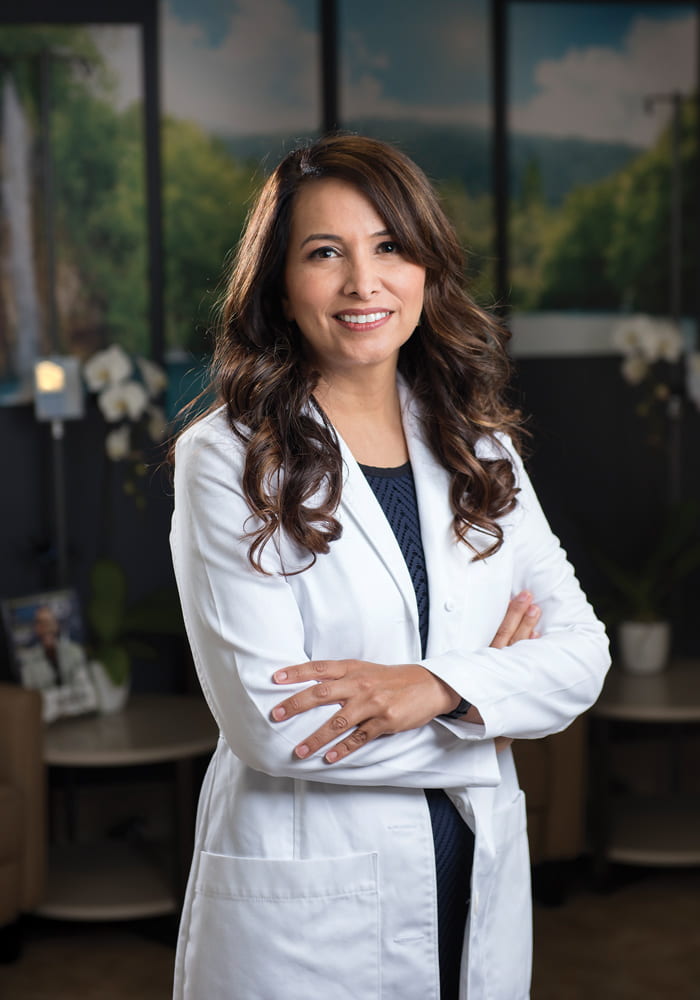A Heart for Healing
Cardiologist’s family history inspires innovative program to prevent coronary disease

Since childhood, Shaista Malik has been surrounded by heart attacks. Four of her five aunts and uncles were felled by coronary disease. And when Malik was 10, her family was uprooted from Pakistan by a cardiac episode across the Pacific. She, her brother and their mother immigrated to Anaheim, where Malik’s grandma needed live-in care at home after bypass surgery.
“In my family, everyone gets heart attacks in their 40s and 50s,” she says. “That’s a big part of why I became a cardiologist.”
But Malik – a Savanna High School valedictorian who has two bachelor’s degrees from Stanford University (biology and history), an M.D. from UCI (’00), and a master’s and Ph.D. from UCLA – soon encountered a conundrum. After watching countless heart patients resume unhealthy habits after getting stents or other procedures, “I felt like I wasn’t making a lasting difference,” she recalls.
Hoping to break the cycle, Malik launched a cardiac prevention program at UCI five years ago. Over eight 90-minute sessions, participants conferred with a dietitian and an exercise physiologist on strategies to lose weight and restore their well-being.
The results were often dramatic, she says: “I could see the power of nutrition and lifestyle adjustments to improve people’s health trajectory.”
Artichokes and Acupuncture
Before long, a waiting list developed. But Malik wasn’t entirely satisfied. She realized a key element was missing from her regimen: stress reduction.
Because her team had no expertise in that subject, she sought help from UCI’s Susan Samueli Center for Integrative Medicine. Based in a sunlit, second-story Costa Mesa office outfitted with soothing background music, aroma sticks and a human brain poster, the clinic specializes in nonconventional therapies, including yoga and mindfulness to boost tranquility.
After noticing that her cardiac group exercised more and ate better while practicing stress management techniques, Malik started exploring other treatments offered by the Samueli Center.
“I had women with microvascular disease who were taking eight or nine medications but still showing symptoms,” she recalls. So Malik added acupuncture to their treatment plans and, she says, the symptoms cleared up.
Another set of patients couldn’t take anti-cholesterol statin drugs because of side effects. Malik put them on herbal supplements – such as berberine (derived from barberry), artichoke extract and citrus bergamot, alone or in combination with decreased statin doses – and again achieved positive results, she says.
Overall, she notes, the cardiac prevention program’s success rate (loosely defined as long-term weight loss, regular exercise and lower cholesterol) rose from roughly 35 percent before integrative methods to nearly 55 percent after. About 300 people have been through the program, which also includes lab tests, genetic screening and cardiac imaging to assess heart disease risks.
“The mind-body connection is a very important aspect of our health and well-being,” Malik says.
A Research Mecca
In 2015, Malik was named director of the Samueli Center, which opened in 2001 and will be elevated to an institute under UCI’s new integrative health plan. Upon moving into expanded quarters inside the future Susan and Henry Samueli College of Health Sciences building on campus, the institute will focus heavily on interdisciplinary research designed to nail down which nonconventional treatments work and why.
“I had women with microvascular disease who were taking eight or nine medications but still showing symptoms.”
Fifteen endowed professors will be hired for the endeavor, a number Malik calls unprecedented. “Most other integrative programs have only a handful of research faculty,” she says.
The Samueli Center is already known for acupuncture studies. And Malik is leading a five-year, National Institutes of Health-funded analysis of using biomarkers and DNA tests to better predict heart disease. As for her own family’s genetic tilt toward cardiac trouble, Malik is doing her best to keep things in check, but pockets of resistance remain. “I had my mother on all the right supplements and medications,” she says. “But she won’t listen to me on the lifestyle part.”